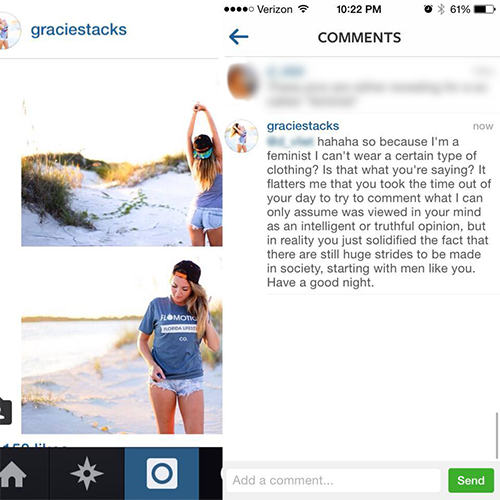By Gracie Stackhouse | gargoyle@flagler.edu
Recently, a man commented on photos taken of me for a local company’s website. While I usually never have problems on social media, his comments were negative and discriminatory. Though I was wearing a tank top and a pair of jean shorts, he told me the pictures were “rather revealing for a so called “feminist.”
His comments surprised me and brought to my attention the fact that society still has an image of what a feminist is “supposed” to look like.
I’m sure for many people, Rosie the Riveter comes to mind. Muscular arms, intimidating face, bandanas, masculine features; is this what makes a feminist?
Regardless of one man’s opinion on how a feminist should dress, there are many issues that are brought to light by just a few words typed on my picture. Why is the word “feminist” spoken like an insult? Why is the phrase “she is such a feminist” said in a derogatory tone? Feminism shouldn’t be a negative term.
If you looked up the definition of feminism, you would find it described as “the advocacy of women’s rights on the grounds of political, social and economic equality to men.” This is what a feminist is—there are no restrictions on what you look like or what you wear.
A feminist is simply a person who believes that women should have equal rights as men. Feminism is not limited to women; anyone who believes in women having equal rights has already sided with the feminist movement.
So what makes a “bad” feminist? Revealing clothing? Is this the tipping point for whether you are a “good” feminist or a “bad” one? In my opinion, this doesn’t exist. You can’t label somebody as “good” or “bad.” Just because I wear a tank top and shorts in a few pictures doesn’t mean that I don’t believe in equality.
Does shaving my legs and armpits mean that I don’t believe in equality too? Do I have to grow out my hair and wear baggy pants and hoodies in order for people to view me as a “good” feminist? There is a stigma that surrounds those who identify themselves as feminists that it becomes very difficult for those who stand firm in their feminist identity.
Once you identify yourself as a feminist, every action you take will be put under a microscope to examine whether you are a “real” and “good” feminist or not. I think this needs to stop. If a human being believes in equal rights, let them do so. Do not stick them on a pedestal or trap them under a spotlight.
Instead, let’s start having respect for those who boldly stand up for their beliefs and other people’s rights. Let’s start to take the stigma associated with the word “feminist” and turn it around.
Let feminism be simply what it is: a fight for human rights.






Be the first to comment on "Why I’m a “bad feminist”"